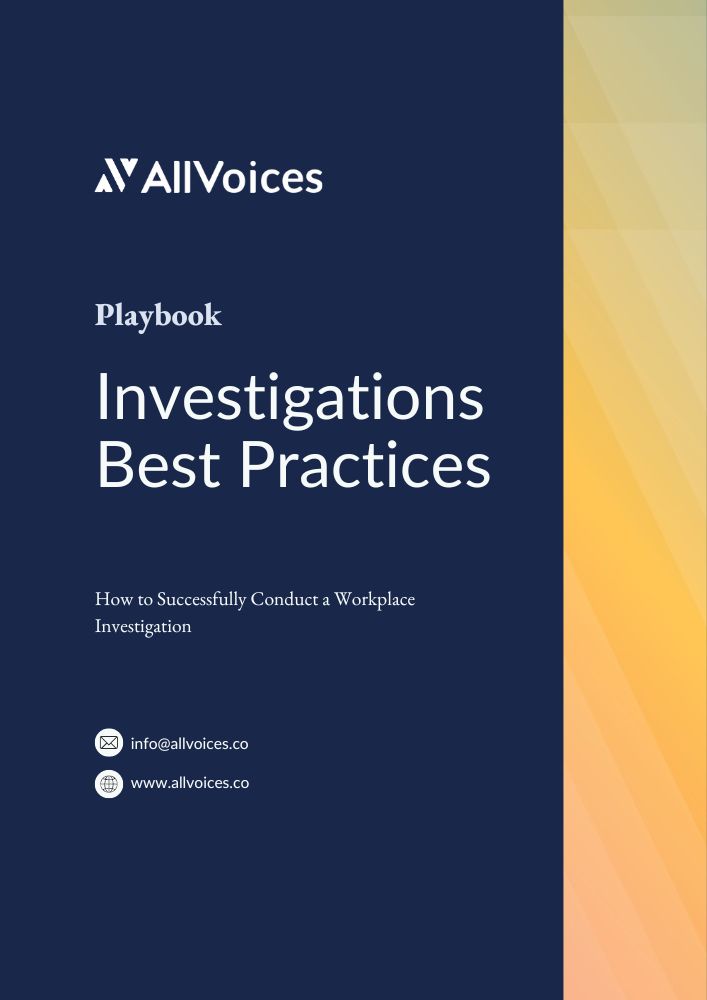It’s Tuesday morning, and you receive an email with the subject: "CONFIDENTIAL: Workplace Investigation—Immediate Action Required.” As an HR professional, you have an idea of what’s ahead of you: difficult conversations, a lot of paperwork, evidence to analyze, and sleepless nights spent worrying about the effectiveness of the process in your organization. Even though this is not your first, it always feels like the first time. And, no matter the anxiety, the moment to “open” the email is inevitable.
Indeed, workplace investigations are not easy, as one misstep can lead to catastrophic consequences—broken trust, legal repercussions, and a toxic work environment that undermines even the strongest company culture. Consequently, this is a process during which you may experience high-stress levels.
However, workplace investigations should be handled with care, skill, a commitment to fairness, and effectiveness. Investigations can also be a powerful catalyst for positive change. By examining issues and giving employees a safe environment to voice concerns, HR teams can resolve individual conflicts and identify and address deeper systemic problems. Companies that handle investigations will often significantly improve employee morale and productivity.
7 Key Steps for Effective Workplace Investigations
Workplace investigations are complex, with various pieces of information scattered about, different perspectives to consider, and a final picture that's only sometimes clear from the beginning. Therefore, the challenge lies in methodically gathering those pieces, assessing them objectively, and ultimately fitting them together to reveal the facts. Nevertheless, conducting effective investigations requires analytical skills, emotional intelligence, strategic thinking, and a deep understanding of human behavior.
At the end of the day, investigations involve facts and delicate relationships, regaining trust, and making decisions that can impact people's lives and careers. That's why having a transparent, structured process is so critical. When emotions are running high, and the pressure is on, a clear path can be the difference between a fair, thorough investigation and a flawed one that leaves everyone feeling worse off. And while every case is unique, learning certain fundamental principles and practices can help you navigate even the most demanding situations with confidence, competence, and care.
1. Develop and Enforce Robust Investigations Policy
A clear, comprehensive investigations policy is the bedrock of an effective process. It should detail the procedures to be followed, the roles and responsibilities of each party, and the expectations for confidentiality, impartiality, and timeliness. Crucially, this policy must be consistently enforced and regularly reviewed to ensure it remains fit for purpose.
2. Respond Swiftly and Sensitively to Complaints
When a complaint lands on your desk, time is of the essence. A prompt, empathetic response proves that you take employee concerns seriously and helps foster a culture of trust and psychological safety. Aim to acknowledge receipt of the complaint within 24 hours and keep the involved parties updated on expected timelines for the next steps.
3. Choose an Impartial Investigator
Selecting the right person to lead the investigation is critical. Depending on the nature and severity of the allegations, this might be a trained HR professional, a member of the legal team, or an external investigator. Whoever you choose must be impartial, objective, and free from actual or perceived conflicts of interest.
4. Secure and Analyze All Relevant Evidence
A thorough investigation relies on comprehensive evidence collection. It may include physical evidence, digital records (emails, chat logs, etc.), security footage, and firsthand interview accounts. Gathering and documenting all relevant information as soon as possible while memories are fresh and before any potential tampering is essential. As you analyze the evidence, maintain strict objectivity and avoid jumping to conclusions.
5. Conduct Thorough and Respectful Interviews
Interviews are crucial to any investigation, but they require a delicate touch. Follow best practices outlined by experts like AllVoices, such as conducting interviews in a private setting, asking open-ended questions, practicing active listening, and taking detailed notes. Above all, treat every interviewee with respect and empathy, recognizing the emotional toll that the process may take on them.
6. Maintain Comprehensive Documentation
Meticulous documentation ensures an investigation's integrity and legal defensibility. Keep detailed records at every process stage, including the initial complaint, interview notes, evidence logs, and final reports. A clear, thorough paper trail indicates compliance and protects the organization in the event of future legal challenges.
7. Communicate Findings and Act Transparently
Once the investigation is complete, it's time to share your findings with the necessary parties. Balance the need for transparency with the imperative to protect confidentiality – share what is required and never divulge sensitive details more broadly than needed. Crucially, follow through on any recommended actions arising from the investigation, whether that's disciplinary measures, policy changes, or support for affected employees.
By keeping these seven steps front and center, you'll be well-positioned to handle workplace investigations with the seriousness, sensitivity, and skill they demand. Remember, every challenge is an opportunity to build trust, foster a healthier culture, and ultimately create a workplace where every employee can thrive. How can you make these steps seamless in your investigation process, ensuring fairness and building trust with every case?
6 Additional Considerations for Workplace Investigations
Beyond the core steps of the process, you must also navigate various legal, ethical, and interpersonal considerations since failure to do so can undermine the effectiveness of the investigation and expose the organization to significant risks.
Moreover, by addressing these considerations and incorporating them into their investigation strategy, you can also display professionalism and competence that enhances the credibility of the process and fosters trust among employees. This, in turn, contributes to a more positive workplace culture and a more vital overall organization.
1. Types of Investigations
Formal investigations, which follow a structured process and are typically used for more serious allegations, and informal investigations, which are more flexible and may be appropriate for minor issues, serve different purposes. So, you must carefully evaluate the nature and severity of each situation to determine the most suitable approach, considering factors such as the potential for legal liability, the impact on the individuals involved, and the overall effect on the workplace environment.
2. Legal Compliance
Workplace investigations occur within a complex legal framework governed by various anti-discrimination laws, labor regulations, and other applicable statutes. To ensure compliance and mitigate legal risks, you must comprehend these laws and how they apply to different investigations. Which may involve consulting with legal counsel, staying up-to-date on legislative changes, and ensuring that all investigation practices and procedures align with relevant legal requirements.
3. Employee Privacy & Confidentiality
Investigations often involve sensitive personal information, and employees have a right to privacy and confidentiality. So, you must take the proper steps to protect this information, such as conducting interviews in private settings, securely storing investigation records, and limiting access to sensitive data. At the same time, communicating the limits of confidentiality to those involved, as certain information may need to be disclosed to conduct a thorough investigation or comply with legal obligations.
4. Importance of Investigator Training
Conducting effective investigations requires a unique set of skills and knowledge. Therefore, investigators must be able to gather and analyze information objectively, interview witnesses sensitively, and make sound judgments based on the evidence. To ensure that investigators are equipped to handle these responsibilities, organizations should prioritize regular training on interviewing techniques, evidence collection and evaluation, legal requirements, and avoiding bias. Investing in professional development enhances the quality of investigations and shows the organization's commitment to fairness and due process.
5. Utilizing Technology
Nowadays, technology, besides being a powerful tool for streamlining investigations and ensuring consistency, is necessary. Case management platforms like AllVoices allow you to securely store and organize evidence, track case progress, and generate detailed reports. With such tools, your HR team can work more efficiently, reduce the risk of errors or omissions, and ensure that all investigations are standardized and compliant. Technology can also support data analysis efforts, helping you identify trends and patterns that may indicate underlying issues or areas for improvement.
6. Proactive Problem-Solving
While investigations are often reactive, they can also provide valuable insights for proactive problem-solving. You can identify potential issues before they escalate into full-blown crises by regularly analyzing data from investigations, employee surveys, exit interviews, and other sources. Which also allows for earlier and more targeted interventions, such as training, policy updates, or organizational changes. By taking a proactive approach to problem-solving, HR can contribute to a more positive and productive workplace culture while reducing the need for costly and time-consuming investigations.
4 Actionable Steps to Improve Workplace Investigations
1. Prioritize Investigator Training: Even seasoned HR professionals benefit from regular training updates on legal compliance, best practices in interviewing, identifying unconscious bias, and navigating complex emotions.
Action: Partner with legal counsel or external experts to develop a curriculum. Schedule mandatory training sessions, and consider offering specialized courses for specific investigation types (ex., harassment, discrimination).
Example: An HR generalist receives a bullying complaint. Because of recent training, they identify subtle red flags in the language used that could indicate underlying discrimination based on a protected class. It prompts them to consult with an expert, potentially saving the company from legal action.
2. Emphasize Proactive Communication: Transparency builds trust. Keeping complainants, witnesses, and the accused informed about timelines and processes reduces anxiety and avoids perceptions of cover-ups.
Action: Establish clear communication protocols within your investigations policy. Provide regular status updates (even if "the investigation is ongoing") and offer estimated timeframes whenever possible.
Example: A complaint triggers a complex investigation. HR sends biweekly updates to the involved parties, acknowledging delays and providing general information on steps being taken. It minimizes further complaints and demonstrates that the matter is being handled seriously.
3. Embrace Technology for Efficiency: Case management software streamlines organization, evidence tracking, and report generation, freeing up time for the human-centered aspects of investigations.
Action: Research platforms like AllVoices to identify tools that match your organization's needs. Advocate for the budget, emphasizing long-term gains in efficiency and data analysis potential.
Example: Using a standardized template, an HR professional quickly generates an initial interview report, allowing more time to focus on the interviewee's emotional well-being and establishing the next steps.
4. Adopt a Problem-Solving Mentality: Investigations are an opportunity to uncover systemic issues and improve workplace culture.
Action for HR: Implement regular trend analysis from investigation data. Include this in broader company reporting on metrics like turnover, satisfaction surveys, and exit interviews to identify potential root causes.
Example: Multiple investigations reveal a pattern of complaints about a particular manager. It prompts HR to implement targeted management training or a cultural assessment of that department, potentially preventing future escalations.
Action Plan
Strategic Initiatives
Revisit Your Policy: Partner with legal counsel to update your investigations policy, ensuring it aligns with current law and reflects best practices. Clearly outline timeframes, communication expectations, and available support resources.
Invest in Training: Implement comprehensive training for investigators. Focus on interviewing techniques, legal compliance, and unconscious bias. Consider recurring refresher courses.
Technology Adoption: If not already established, research and advocate for HR case management software. Tools like AllVoices streamline investigations, enhance organization, and improve analysis capabilities for future problem-solving.
Process Refinements
Standardize Interviews: Develop templates with open-ended questions aligned with AllVoices' guidance to ensure a consistent experience for all parties. Maintain sensitivity while asking thorough, legally sound questions.
Streamline Evidence Collection: Establish clear protocols for gathering and securing evidence, including digital evidence like social media. Invest in secure digital storage solutions as needed.
Proactive Communication: Utilize templates for acknowledging complaints and regular status updates. Transparency builds trust and demonstrates your commitment to a fair process.
Immediate Wins
Prepare an Employee Resource List: Provide all involved parties with information on support services (EAP programs, mental health resources), their rights within the process, and links to anti-discrimination laws or internal policies.
Conduct a 'Pulse Check': Use tools to run sentiment analysis to gauge employee perceptions of workplace fairness and psychological safety. It can uncover potential concerns before they escalate into formal complaints.
Remember: Even small changes can significantly improve your workplace investigations. This Action Plan gives you a customizable roadmap for building a system that protects your people, fosters trust, and safeguards your organization.
Key Insights
Preparation is Paramount: A robust investigations policy, regular investigator training, and investment in HR technology lay the foundation for smoother, more effective investigations that minimize stress for all parties.
Process and People Matter Equally. Standardized protocols, transparent communication, and attention to participants' emotional well-being are crucial for upholding fairness and promoting trust.
Investigations as Opportunity: Utilize the data and insights gathered during investigations to proactively address systemic issues, creating a more equitable workplace for everyone.
Download the Playbook 'Investigations Best Practices'
Want to streamline your workplace investigations?
Click here to download the AllVoices E-Book, which offers essential HR strategies and practical tools.
Hacking HR
We are powering the future of HR!
Hacking HR is the fastest-growing global community of people leaders and professionals interested in all things at the intersection of people, organizations, innovation, transformation, workplace and workforce, and more. We deliver value through hundreds of events a year, community engagement opportunities, learning programs, certificate programs, and more. Join our community platform, the Hacking HR LAB. Click here to join the community!



